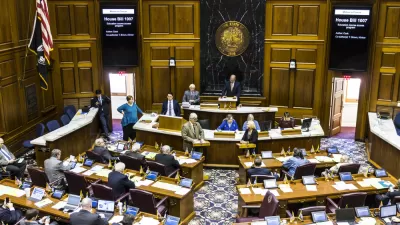The Idaho Trucking Association wants to reduce the state's $262 million road and bridge maintenance shortfall by passing a six-cent increase in the fuel tax over three years. The AAA opposes it because most of the bill will fall on motorists.
In the first segment of this two-part article, Julie Pipal, president/CEO of the Idaho Trucking Association, makes the case for a graduated six cents-per-gallon gas and diesel tax—the subject of House Bill 481 [PDF] proposed last year.
It has been 18 years since Idaho increased the fuel tax. In fact, that was the last time the state increased either fuel tax or registration fees — the two state sources of funding for Idaho’s state road and bridge system. In the interim we have relied heavily upon federal funding to improve our transportation system.
The current gas and diesel tax is 25-cents per gallon [PDF], over five cents below the state average. Pipal cites the 2010 Governor's Task Force on Modernizing Transportation Funding which "reported that Idaho needed an additional $262 million in revenue just to keep up with maintenance and repair costs. If improvements were added to that list, it is upwards of $600 million."
Opposing the tax increase, the AAA notes that "nearly $37 million of the eventual $53 million annual amount [from House Bill 481] will come from passenger vehicles, not trucks."
“The Idaho Trucking Association pitched this bill as putting its money where its mouth is, but this is a gas tax, paid primarily by motorists,” said Dave Carlson, AAA Idaho public affairs director. “It’s less a solution and more of a public relations strategy.”
AAA sees the problem as one of "inequities between user groups," as the sub-heading of the press release [PDF] for their "Better Roads. Fair Funding" for Idaho campaign states. Motorists are paying disproportionately, according to "data from Idaho Transportation Department and the Idaho Tax Commission," writes AAA. "(G)as taxes comprise 71 percent of state fuel tax revenue. Diesel and special fuels taxes account for 29 percent."
According to the [most recent] cost allocation study report, one scenario shows that special fuels (diesel) tax would have to be raised to $1.30 a gallon to achieve a fuel tax equity balance between passenger vehicles and trucks over 26,000 pounds.
Pipal writes that "the real value (in the legislation) will come in the conversations Idahoans will collectively have about how we solve our transportation problems." Hopefully she will speak to Carlson, who makes a convincing case that truckers need to pay more of the freight when it comes to the repair and maintenance of roads and bridges.
While $1.30 diesel tax increase may not appear credible, if she is really serious about paying for transportation infrastructure she might offer a larger diesel tax increase to go with the six cent gas tax hike.
One suggestion: Pattern it after the federal gas tax [18.4-cents] and diesel tax [24.4 cents]; i.e., increase the diesel tax by four-cents each year for three years rather than two-cents for gasoline. If AAA wants a higher diesel tax, point to the Energy Information Administration webpage that indicates the average difference between gas and diesel taxes is a mere .78 cents.
Carlson of the Idaho AAA is hopefully aware that on the national level, AAA supports increasing the 22-year-old federal gas and diesel taxes.
Finally, Carlson should look for a precent where states have disproportionately addressed gas and diesel tax increases. On March 17, Gov. Dennis Daugaard (R-S.D.) signed a six-cents fuel tax increase bill that will become effective April 1 (no April Fools joke—it will not even be incremental, as proposed in HB 481), with no difference between gas and diesel taxes, according to The Associated Press (via The Daily Republic).
- Iowa's 10-cents fuel tax increase, effective the first of this month, applies to gas and diesel.
- Ditto for Utah's 5-cents fuel tax (if signed). However, an earlier form of the bill had a 10-cents increase in the gas tax and a 5-cents increase in the diesel tax, showing the importance of having motorist groups engage in dialog with the trucking community.
FULL STORY: Transportation: Is it time to raise gas tax 6 cents?

Maui's Vacation Rental Debate Turns Ugly
Verbal attacks, misinformation campaigns and fistfights plague a high-stakes debate to convert thousands of vacation rentals into long-term housing.

Planetizen Federal Action Tracker
A weekly monitor of how Trump’s orders and actions are impacting planners and planning in America.

Chicago’s Ghost Rails
Just beneath the surface of the modern city lie the remnants of its expansive early 20th-century streetcar system.

Bend, Oregon Zoning Reforms Prioritize Small-Scale Housing
The city altered its zoning code to allow multi-family housing and eliminated parking mandates citywide.

Amtrak Cutting Jobs, Funding to High-Speed Rail
The agency plans to cut 10 percent of its workforce and has confirmed it will not fund new high-speed rail projects.

LA Denies Basic Services to Unhoused Residents
The city has repeatedly failed to respond to requests for trash pickup at encampment sites, and eliminated a program that provided mobile showers and toilets.
Urban Design for Planners 1: Software Tools
This six-course series explores essential urban design concepts using open source software and equips planners with the tools they need to participate fully in the urban design process.
Planning for Universal Design
Learn the tools for implementing Universal Design in planning regulations.
planning NEXT
Appalachian Highlands Housing Partners
Mpact (founded as Rail~Volution)
City of Camden Redevelopment Agency
City of Astoria
City of Portland
City of Laramie





























